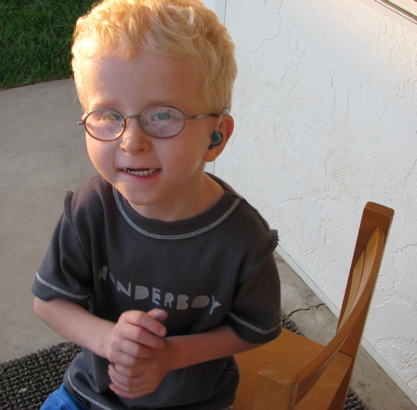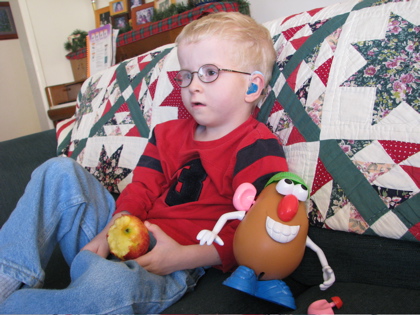The other day I mentioned
that Wonderboy got another new diagnosis this summer and I have been
wanting to write about it but needed to think through the privacy
issues first. After taking some time to ponder, Scott and I agreed that
this is something just as important to write about as the challenges
and joys we’ve experienced as a result of our boy’s hearing loss, and
that blogging as frankly about this new challenge as I have about other
things is for the good—Wonderboy’s, ours, other families’. I know how
much I have benefited from hearing other parents’ stories and advice
over the years—during Jane’s cancer treatments, and Wonderboy’s early
medical adventures, and during all sorts of challenges related to
nurturing special needs children.
Information-sharing is a very good thing.
I said "this new challenge," but the only thing new about it is that
doctors put a name on what I had already been suspecting for some time.
Wonderboy is mentally retarded.
During my son’s first two or three years, any gaps in his
comprehension were easily accounted for by his hearing loss and speech
delay. But this past year, especially as Rilla (who is two and a half
now) has zoomed past Wonderboy developmentally in many ways, we
wondered more and more if there perhaps there was some other piece of
the puzzle yet to be named. He is four years and nine months old, but
he still doesn’t recognize colors by name—though he’s been signing
color words since he was a baby. He doesn’t understand days of the
week, is only just beginning to grasp "yesterday, today, tomorrow,"
can’t count past three or four, enjoys baby board books but isn’t yet
ready for storybooks.
He’s a dear, jolly, affectionate soul, the joy of our household. I’m
not sure when I knew for certain that he had some kind of cognitive
deficit overlaid on the hearing-loss challenges. I first used the word
"retarded" tentatively, questioningly, in an IEP meeting last winter.
(He receives speech therapy and audiology services from our public
school district but that’s all.) My words were met with dead silence
around the table, and for once the school district "team members," who
usually have so much to say about everything, said nothing at
all. I thought perhaps I’d blundered, had used a non-PC term, and after
an awkward pause, the discussion moved on: we were there to talk about
speech therapy and audiology, and nothing more was said about a
cognitive deficit.
At the time I already had him on a waiting list for an in-depth
evaluation with the behavorial/developmental clinic at the children’s
hospital: an appointment Wonderboy’s geneticist and pediatrician had
been strongly recommending for months. The wait was very, very long:
the evaluation did not occur until this past July. By then we were
reasonably certain in our own minds that autism was not on the table:
based on everything I’d read, Wonderboy did not meet the
social/communicative criteria for an autism spectrum diagnosis. And
sure enough, the four-hour battery of tests confirmed that he is not on
the spectrum. "But there is a cognitive issue," the doctor said, "something you need to know…"
I’m not sure what official diagnosis I expected, but I know that the
words themselves, when they came, even though I’d had my own
suspicions, were a shock—not the condition so much as the terminology.
"Mental retardation" is a label with an awful lot of baggage,
especially for people of my generation. Was there anything more
insulting you could call someone in grade school, or be called, than
"retard"? And twenty, thirty years later, that slur is causing just as
much pain and controversy as it ever did.
Being something of a word person, I was fascinated by the reaction
the words got when we told friends and family about the diagnosis.
Honestly, I think I had to spend more time talking to people about the terminology than the condition it describes. Even the Wikipedia entry
begins with a long discussion of the various terms that have been used
and discarded over the years—discarded after common usage coopted a
clinical term for use as an insult. First "cretin," then "idiot" and
"imbecile" (indicating differing degrees of cognitive disability), then
"moron," a word invented by doctors in the early 20th century, and when
that became a slur like the others, "mentally retarded" came into use.
I learned that the American Association on Mental Retardation renamed itself in 2006: it is now the American Association on Intellectual and Developmental Disabilities, and its preferred terminology for mental retardation is now "intellectually disabled."
That sounds so jargony to me. I can’t imagine using it in
conversation. Also quite a mouthful is the broader term "developmental
disability," which does encompass Wonderboy’s physical and
cognitive delays. I am seeing that term used quite a bit online, on
special-needs forums and such. I suppose it lacks the emotional baggage
of "mentally retarded," but for us it’s a moot point anyway, because
here in Southern California at least, "mental retardation" is still the
clinical term in common use: it’s what appears on Wonderboy’s charts
now, and whenever I walk into a doctor’s office and am asked, as I
always am, "what’s his diagnosis," among the list of medical and
developmental terms I rattle off is, now, mental retardation. Which is
fine with me.
Whatever you call it, the fact is that my boy’s brain doesn’t work
the same way most four-going-on-five-year-olds’ brains do. At this
point, he has great difficulty grasping abstract concepts. His language
skills are actually quite good—as long as we’re talking about concrete
things. Most abstract concepts seem to elude him right now.
Developmentally, he is much more like a two-year-old than a
four-year-old.
And he is wonderful. His joy, his eagerness, his abundance of love
and affection—these are the qualities that melt me a hundred times a
day, the qualities that make him uniquely him. He is his sisters’
darling. The way he laughs and literally quivers with excitement
whenever one of us has been away for a few hours and returns home: his
happiness is completely infectious, and I’ve seen him set whole rooms
of people to smiling.
This is not to say there aren’t challenges: there are many. After
the diagnosis, when fuzzy suspicion became clear understanding, I
realized that I pretty much have two-year-old twins at the moment. No
wonder I’m always wiped out! Pregnant, pushing forty, with toddler
twins: you better believe I began cutting myself a whooole lot more
slack after I fully grasped the reality here.
For me it is always better to have a name for something, better to
have a firm diagnosis to wrap my head around. And so although those
words were initially a bit of a jolt, in many ways they made life much
easier.
I have volumes to say about all the different aspects of this newly defined reality, and much yet to learn. I learned a long time ago
that the blessings that come along with a special-needs child are
immense—and immensely beautiful. I love my little guy to pieces.
Doesn’t that grin just make you melt? Oh, he is the sweetest boy! I was
laughing last week because four separate people—two different PTs who
saw him on separate days, his speech therapist, and her assistant—all
remarked to me, spontaneously, independently, a variation on the same
exact statement: "Your son is so much fun to work with! What a
sweetheart he is." 🙂
Ain’t that the truth.

Good grief, somebody clean that kid’s glasses!





